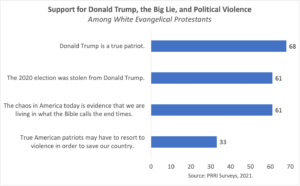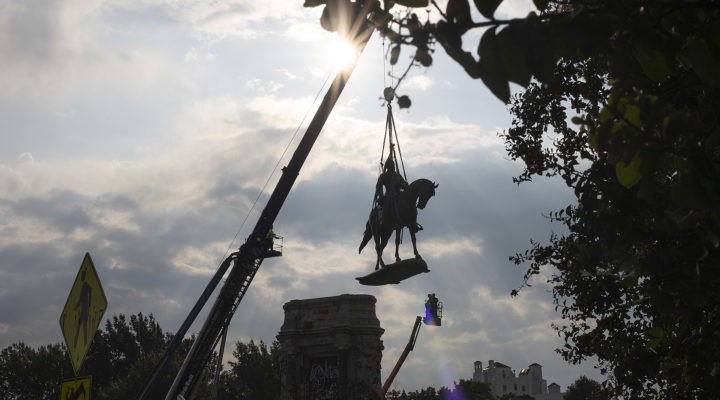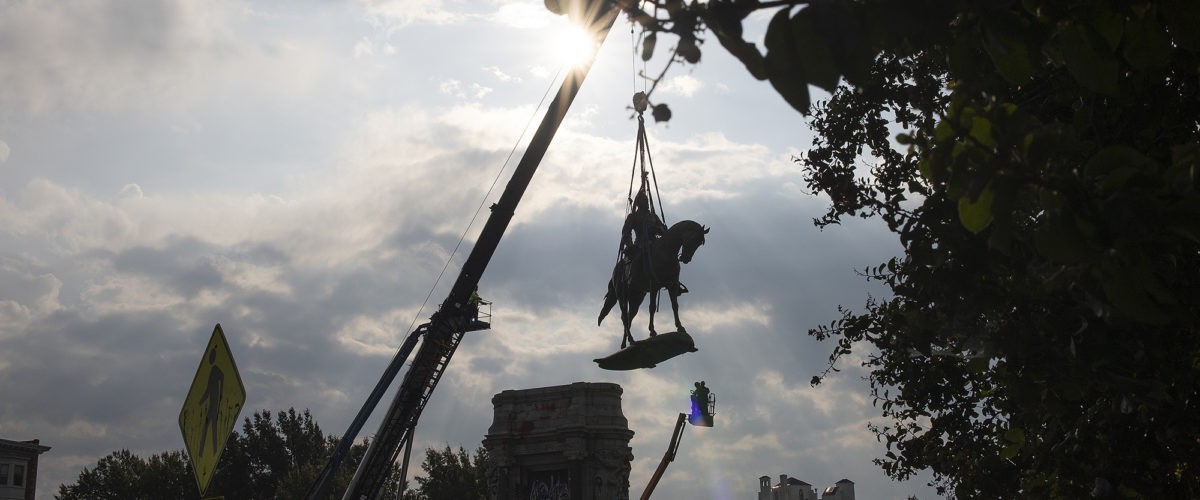BNG is pleased to announce a new partnership with Robert P. Jones and PRRI that will bring a new column by the author to BNG’s site every Monday, beginning today.
Earlier this month, we were in a remarkable space between two weekends — one marking the 20th anniversary of 9/11 and another with demonstrations of public support for the 1/6 insurrectionists.
In a previous post, I wrote about how white evangelicals’ misguided post-9/11 zeal to make foreign extremism about Islam actually fertilized the soil for the growth of domestic white Christian extremism.
This week, I reflect on disturbing new data from PRRI about white evangelical Protestants, in light of the recent “Justice for J6” rally in D.C. in support of Trump and insurrectionists who violently attacked the U.S. Capitol building.

Robert P. Jones (Photo by Noah Willman)
Much of my research and writing over the past five years — and a significant portion of my conversations with reporters — has been an attempt to make sense of the seemingly inexplicable fealty of conservative white Christians to Donald Trump. In articles and interviews, I’ve written and spoken empathetically about the grief and angst white Christians, and white evangelicals specifically, have been experiencing as their numbers and cultural influence have continued to wane since the mid-2000s.
I grew up in and was shaped deeply by white evangelical Christianity. I hold degrees from a Southern Baptist seminary and a Southern Baptist college. I’ve spent the last two decades of my professional life researching and following white evangelical culture. Like many observers these last five years, I’ve grasped that the takeover of the Republican Party by Donald Trump and his presidency provided a moral and religious test for white evangelicals.
I’ve been diligently observing, waiting to see what line Trump could cross that would trigger outrage and rebuke from the white evangelicals who enabled his rise to power. There has been none. As Trump has disparaged immigrants, demonized Muslims, encouraged white supremacist groups, valorized the Confederacy, and used the Bible as a political prop, white evangelicals have not only sat idly by but incorporated these bigoted values into what they then defend as a biblical worldview.
As we look back on an election in which democracy only narrowly survived and to the mounting empirical evidence that white evangelicals have lent support to its demise, we must face — for the sake of our country and American Christianity — the clear and present danger lurking among white evangelicals today.
“We must face — for the sake of our country and American Christianity — the clear and present danger lurking among white evangelicals today.”
After animating each of his campaigns and conducting his presidency with explicitly racist tropes, after refusing to participate in the treasured American rituals signifying the peaceful transition of power, and even after supporting an attack on democracy itself when he lost the election, Trump has retained the support of a solid majority of white Christians.1 Trump garnered the votes of nearly six in 10 white mainline (non-evangelical) Protestants and white Catholics in 2020, according to Pew’s validated voter study. Most strikingly, his support among white evangelical Protestants actually increased from 77% in 2016 to 84% in 2020.
Lest you think that this suspension-of-the-norm thinking left with Trump’s forced exit, new PRRI data, just released last week, shows continued white evangelical support for Trump, the Big Lie, and even political violence. Among white evangelical Protestants today:2
- 68% believe Trump is a “true patriot.”
- 61% believe the Big Lie that the 2020 presidential election was stolen from Trump.
- 57% say liberal or left-wing groups bear responsibility for the violent attacks on the U.S. Capitol building on Jan. 6, compared to only 26% who blame Trump.
- 61% believe that “the chaos in America today is evidence that we are living in what the Bible calls ‘the end times.’”
- One in three (33%) believe that “true American patriots may have to resort to violence in order to save our country.”
- One in four (25%) are QAnon conspiracy believers, including holding the outlandish belief that “the government, media and financial worlds in the U.S. are controlled by a group of Satan-worshipping pedophiles who run a global child sex trafficking operation.” (That’s a survey question I could never have imagined myself writing prior to 2020).
 In an Afterword to the paperback edition of The End of White Christian America, published just six months after Trump took office, I didn’t pull punches at what I saw as a morally and religiously compromised public witness by white evangelicals.
In an Afterword to the paperback edition of The End of White Christian America, published just six months after Trump took office, I didn’t pull punches at what I saw as a morally and religiously compromised public witness by white evangelicals.
Like the biblical story of Esau, who exchanged his inheritance for a pot of stew, white evangelicals have traded their distinctive values for fleeting political power … . [The 2016] election will most likely be remembered as the one in which white evangelicals traded away their integrity and influence in a gambit to resurrect their past.
But I also wrote, with some generosity and genuine hope, that with a short-term political victory in hand, white evangelicals might recover from a grieving process about the loss of “White Christian America,” rediscover their religious integrity, and rejoin their fellow citizens in the great American experiment in democracy. This is the closing sentence of the Afterword:
At the end of the day, white evangelicals’ grand bargain with Trump will be unable to hold back the sheer weight of cultural change, and White Christian America’s descendants will be left with the only real move possible: Acceptance.
I wrote that sentence because I failed to imagine the alternative. I wouldn’t write that sentence today.
We braced ourselves for potentially violent demonstrations in our nation’s capital once again last weekend. These protesters would attempt to valorize a violent insurrection on behalf of an overtly racist and anti-democratic former president, and they would seek to sanctify those traitorous actions with Christian symbols and rhetoric.
As this data makes clear, we can no longer afford to be complacent or shrug these demonstrators off as a few rogue bad actors. The time for benefits of the doubt has expired. We must face the disheartening reality before us and act to excise the cancer of white Christian extremism from our body politic and our churches. If we have any hope of preventing it from further metastasizing, we will need the courage and voice of every white Christian, lay and clergy alike, to say a collective “no” to this debasement of Christian theology that is eroding the foundations of our democracy.
“I’ve always believed that the cardinal virtue of scholarship is ‘curiosity seeking understanding.’”
And we’ll need the work of scholars, who are equipped to see these patterns amid the chaos. If the heart of religion is, as St. Anselm suggested, “faith seeking understanding,” I’ve always believed that the cardinal virtue of scholarship is “curiosity seeking understanding.”
One of my earliest academic conference presentations and publications was titled, “Ethnography as Revelation,” where I argued that the power of social scientific research is its ability to help us construct reliable narratives of other cultural worlds, to help us comprehend something beyond our own intellectual borders.3
Our jobs as researchers are to make the confusing, even the abhorrent, understandable. And there are times when that is the appropriate end of the scholarly task. But there are other times when religious, moral and civic responsibility requires more. The present is one of those times.
Robert P. Jones is CEO and founder of PRRI and the author of White Too Long: The Legacy of White Supremacy in American Christianity, which won a 2021 American Book Award.
This column originally appeared on Robert P. Jones’s substack #WhiteTooLong. In partnership with the author and PRRI, each Monday BNG will feature a new column from Jones.
Related articles:
From 2016 to 2020, Trump grew in support from white evangelicals
The Trump Card: How white evangelicals are being played | Opinion by Joel Bowman Sr.
___
1 There was a statistically significant drop in support for Trump among white Catholics between 2016 and 2020, but Trump still won this group handily. Moreover, my hypothesis is that this shift was primarily driven by the Catholic identity of Trump’s opponent, Joe Biden, rather than strong antipathy for Trump.
2 It’s also worth noting that the propensity to justify political violence here is connected to ready means to act on this impulse. White evangelical Protestants are significantly more likely than Americans overall to own a gun (41% vs. 30%, via Pew) and to agree that “owning a gun is an important part of my culture” (71% vs. 42%, via PRRI).
3 “Ethnography as Revelation,” in Christian Scharen and Aana Vigen, eds., Ethnography as Christian Theology and Ethics (Continuum, 2012).


